|
|
Read this ebook for free! No credit card needed, absolutely nothing to pay.Words: 59620 in 32 pages
This is an ebook sharing website. You can read the uploaded ebooks for free here. No credit cards needed, nothing to pay. If you want to own a digital copy of the ebook, or want to read offline with your favorite ebook-reader, then you can choose to buy and download the ebook.

: Bob Hunt in Canada by Orton George W - Camps Juvenile fiction; Canada Juvenile fiction@FreeBooksTue 06 Jun, 2023 ERNEST HEMINGWAY The Sun Also Rises Printed in the United States of America "You are all a lost generation." "One generation passeth away, and another generation cometh; but the earth abideth forever. . . . The sun also ariseth, and the sun goeth down, and hasteth to the place where he arose. . . . The wind goeth toward the south, and turneth about unto the north; it whirleth about continually, and the wind returneth again according to his circuits. . . . All the rivers run into the sea; yet the sea is not full; unto the place from whence the rivers come, thither they return again." BOOK I Robert Cohn was once middleweight boxing champion of Princeton. Do not think that I am very much impressed by that as a boxing title, but it meant a lot to Cohn. He cared nothing for boxing, in fact he disliked it, but he learned it painfully and thoroughly to counteract the feeling of inferiority and shyness he had felt on being treated as a Jew at Princeton. There was a certain inner comfort in knowing he could knock down anybody who was snooty to him, although, being very shy and a thoroughly nice boy, he never fought except in the gym. He was Spider Kelly's star pupil. Spider Kelly taught all his young gentlemen to box like featherweights, no matter whether they weighed one hundred and five or two hundred and five pounds. But it seemed to fit Cohn. He was really very fast. He was so good that Spider promptly overmatched him and got his nose permanently flattened. This increased Cohn's distaste for boxing, but it gave him a certain satisfaction of some strange sort, and it certainly improved his nose. In his last year at Princeton he read too much and took to wearing spectacles. I never met any one of his class who remembered him. They did not even remember that he was middleweight boxing champion. I mistrust all frank and simple people, especially when their stories hold together, and I always had a suspicion that perhaps Robert Cohn had never been middleweight boxing champion, and that perhaps a horse had stepped on his face, or that maybe his mother had been frightened or seen something, or that he had, maybe, bumped into something as a young child, but I finally had somebody verify the story from Spider Kelly. Spider Kelly not only remembered Cohn. He had often wondered what had become of him. Robert Cohn was a member, through his father, of one of the richest Jewish families in New York, and through his mother of one of the oldest. At the military school where he prepped for Princeton, and played a very good end on the football team, no one had made him race-conscious. No one had ever made him feel he was a Jew, and hence any different from anybody else, until he went to Princeton. He was a nice boy, a friendly boy, and very shy, and it made him bitter. He took it out in boxing, and he came out of Princeton with painful self-consciousness and the flattened nose, and was married by the first girl who was nice to him. He was married five years, had three children, lost most of the fifty thousand dollars his father left him, the balance of the estate having gone to his mother, hardened into a rather unattractive mould under domestic unhappiness with a rich wife; and just when he had made up his mind to leave his wife she left him and went off with a miniature-painter. As he had been thinking for months about leaving his wife and had not done it because it would be too cruel to deprive her of himself, her departure was a very healthful shock. The lady who had him, her name was Frances, found toward the end of the second year that her looks were going, and her attitude toward Robert changed from one of careless possession and exploitation to the absolute determination that he should marry her. During this time Robert's mother had settled an allowance on him, about three hundred dollars a month. During two years and a half I do not believe that Robert Cohn looked at another woman. He was fairly happy, except that, like many people living in Europe, he would rather have been in America, and he had discovered writing. He wrote a novel, and it was not really such a bad novel as the critics later called it, although it was a very poor novel. He read many books, played bridge, played tennis, and boxed at a local gymnasium. Somebody kicked me under the table. I thought it was accidental and went on: "She's been there two years and knows everything there is to know about the town. She's a swell girl." I was kicked again under the table and, looking, saw Frances, Robert's lady, her chin lifting and her face hardening. Free books android app tbrJar TBR JAR Read Free books online gutenberg More posts by @FreeBooks
: The Gipsies' Advocate Or Observations on the Origin Character Manners and Habits of the English Gipsies by Crabb James - Romanies England@FreeBooksTue 06 Jun, 2023

: More Tish by Rinehart Mary Roberts - World War 1914-1918 Fiction; Humorous stories American; Single women Fiction; Carberry Letitia (Tish fictitious character) Fiction; Middle-aged women Fiction@FreeBooksTue 06 Jun, 2023

: Louis' School Days: A Story for Boys by May E J Edith J - Christian life Juvenile fiction; Conduct of life Juvenile fiction; Boys Conduct of life Juvenile fiction; Boarding schools England Juvenile fiction School Stories@FreeBooksTue 06 Jun, 2023
|
Terms of Use Stock Market News! © gutenberg.org.in2025 All Rights reserved.






